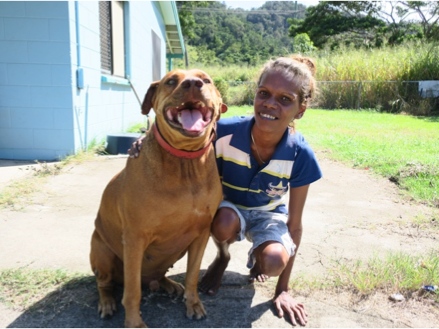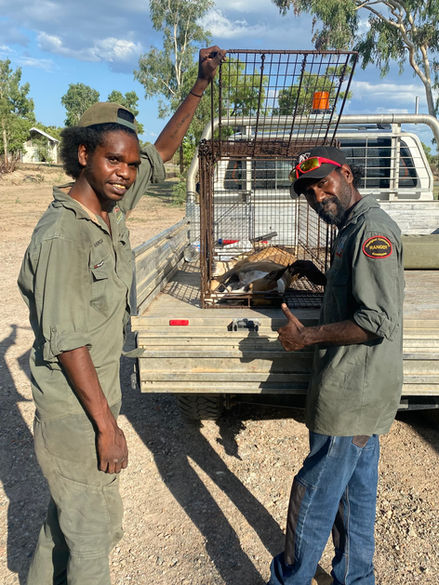
CAN DO
CASE STUDIES
CAN have the experience, knowledge and expertise to establish exemplary and sustainable strategies, which transfer knowledge, support and practical skills to your team on the ground.
WUJAL WUJAL
8 years of animal management.
Successful changes to a community.
Helen will always regard Wujal Wujal community as one of the most life changing places in her life. When moving to the area in 2012, she immersed herself into the community through her love of animals. A veterinary nurse and strong advocate for animal welfare, Helen could not believe that a first world country could be lacking in vital veterinary services in remote locations and that the services that were rarely provided, seemed to be seriously failing the community. Helen began volunteering with the local council to provide support to animal management officers, and so began her understanding of remote communities, local council and realistic expectations. Helen knew that financially things were difficult, but she wanted things to change for the community and for additional support to be provided to workers on the ground. There was no excuse for people to have to witness animal suffering without being able to access any assistance or the correct advice. People and animals should not have to live in such poor conditions. Through regular health checks, veterinary nurse knowledge and support, planning of veterinary visits through professional knowledge of the industry and administration of quality anti-parasitic medications, Helen was able to adapt a program alongside animal management council staff that would benefit the whole community. After all, animal health and population management impacts everyone living and working in these regions. Throughout her years at Wujal Wujal, Helen trained and worked alongside nine animal management and environmental health workers. They witnessed the complete eradication of sarcoptic mange, environmental tick burden, fleas and worms. Animal health improved dramatically with the increase in health knowledge. Residents were able to access veterinary advice for their pets, see the benefits of receiving the correct care and began to take pride in the ownership of their healthy animals. Increased de-sexing had an impact on the population of animals and the reduction of packs, noise and hungry animals positively impacted human behaviour towards animals in the community. Although no evidence was obtained, it seemed that with less dog fights and less unhealthy animals, people’s attitudes altered. Dogs were getting registered, received collars and tags which made them identifiable by name and owners were more accountable for the behaviour of their pets. The health department also reported less incidents of bites to people, less administration of antibiotics and less call outs at night to things such as in-bedded ticks on children. The changes that occurred in Wujal Wujal were exemplary because the people involved genuinely cared about the community and devoted themselves to making improvements. Helen is determined to see this vital veterinary nurse support model role out in all indigenous communities. Support and training are fundamental to officers placed in roles with elevated expectations, often outside of their qualifications.
DISASTER RELIEF
CYCLONE JASPER 2023-2024.
Animal management disaster relief.
The devastation that was caused in the aftermath of cyclone Jasper in December 2023 is still something Helen struggles to comprehend. The Wujal Wujal community, that lives alongside the beautiful Bloomfield River was declared a natural disaster zone after the army evacuated the residents from their homes. With roads, sewage, water and electricity cut, thick river mud through the streets and buildings completely destroyed, the future of the beautiful community seemed uncertain. Helen, who was also unable to access her home knew that her attention needed to be focused on the animals that were left in the community. Unfortunately, all residents were told that they had to leave their pets behind, which added to their stress and grief. As a local resident and with a strong connection to the Wujal Wujal community, Helen joined forces with a nationwide NGO, local charities, police and the local council to step into action for the care of the animals. Liaison with charities such as Remote Animal Assistance enabled donated dog food supplies to be delivered via boat and helicopter. Helen, council staff and local volunteers received these supplies and delivered them to Wujal, visiting house to house and doing daily health checks whilst feeding and watering. Fresh water supplies also needed to be carried in and delivered door to door. The animals, without regular human contact were also suffering psychologically and were starting to get sick with infections. A first aid kit was supplied to Helen as a registered veterinary nurse, to treat animals under vet direction via telecommunications. Infections such as leptospirosis, giardiasis and staphylococcus were a concern and animals were carefully monitored. The local police who also visited the households to provide interaction to the pets were concerned that animals were beginning to wander. After a dog was run over by relief staff and a dog needed to be euthanised from a snake bite, it was clear that a plan needed to be established to move animals to nearby council facilities or to their owners if this was a possibility. Helen offered support to the council to start making arrangements to contact owners and local pound facilities to move the animals. It was still unclear how long it would be before residents could return to their homes. Once the roads started to be passable, animals were collected or moved to safe establishments, leaving only a small more manageable number behind. At this stage disaster relief was well established and the re-build had begun. Large numbers of people were working in the community and council staff could return to the office. The remaining animals were safe and animal health support was no longer required.
HOUSE VISITS. BEFORE AND AFTER.
Regular house-to-house visits and preventative medications.
The most rewarding aspect of Helen’s career has been to witness the dramatic changes to animal welfare in remote regions of Australia, most importantly through the administration of regular preventative medications and availability of professional advice to every household within a community. Helen began her career at a time when government funding was unlikely to be allocated to the new class of ectoparasiticides, highly effective against fleas, ticks and mites. These new medications are expensive for local councils to provide to owners, yet they deliver groundbreaking environmental implications and shifts in one health advancement. Helen has worked with local councils, ranger groups and charities as an independent contractor, also providing professional advice and assistance to government health departments. She has also worked full-time for a nationwide non-government organisation to deliver a census to more than thirty communities, whilst providing professional standards in veterinary care. During this time, the administration of anti-parasitics to every animal at every household has been integral to the shifts in animal welfare and the opinions of veterinary service providers in these areas. With an increase in trust and familiar faces on the ground, animal owners are more likely to engage in these services. This leads to shifts in responsible pet ownership. The gallery shows some images of animals after a successful blanket treatment of Isoxazalolines, the new class of anti-parasitic medications. As you can see from the image gallery, many animal owners placed collars on their dogs once their health improved. Taking ownership and having greater pride in their animals. It is important to note that without veterinary services owners are unable to access information on what to provide their animals when they need help. This knowledge can be shared via regular house visits, empowering owners to provide the correct care themselves.
SUPPORT & TRAINING.
Empowering local indigenous animal management workers and ranger groups.
“Working alongside Helen is a great privilege. I never met anyone who is as passionate about helping animals than her. She’s enthusiastic and very supportive when it comes to helping sick or injured animals. She would be a great asset to any council animal management team. Thanks Helen for your contribution over the years that you have delivered in my community of Yarrabah” Milton Richards, Animal Management, Yarrabah Aboriginal Shire Council. CAN values working alongside local indigenous workers within the community and is committed to providing ongoing support to empower officers in their role. Animal care and responsible pet ownership is vital to the community and an understanding in animal health, diseases and symptoms can increase confidence for animal management workers on the ground. Helen has experience working with six ranger groups across northern Australia and over 30 animal management workers and environmental health workers in Queensland. Along with making the work day as enjoyable as possible and working as part of a team, Helen is culturally respectful and good at communicating with people, who often speak English as their second language. Although CAN does not offer any formal training and qualifications, the knowledge and practical skills obtained on the ground provides workers with greater confidence and job satisfaction. Helen leads by example and will always be the first to muck in, get dirty or crawl underneath houses! “working with Helen puts a smile on anyone’s face. what I’ve learnt along the way just keeps you motivated. I’ve started out, had no experience of working with animals, how to approach them and she talked me through the way they behave when aggressive. Without Helen’s knowledge and understanding I’d still be struggling to get help with my job as animal management worker. Helen does the hard yards every time, her experience means a lot to me plus to anyone who’ve worked alongside her. Thank you so much” Reynold Jupiter, animal management worker, Kowanyama. “I love working with Helen and when I do I felt comfortable, I had lots of fun and being safe and working safely. I want to do more work with Helen hopefully out of Tiwi Islands” Nikita Puruntatameri, Tiwi Rangers.





























